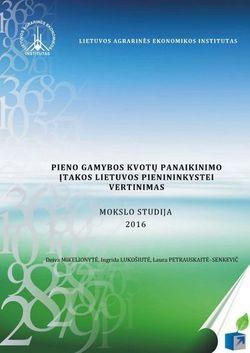
Milk production quotas in the EU since 1984 have been one of the most important raw milk market regulation instrument. The abolition of milk quotas on the 1st of April 2015 changed the market conditions noticeably, although the EU has taken tools to help smooth the transition to the market without quotas. The abolition of milk quotas will affect the EU member states unevenly, because the quotas at the end of their validity were limiting each country marketable milk production in different amounts and because of the other different conditions.
In Lithuania dairy farming is one of the most important agricultural activities. It produces 19-24 percent of total agricultural production and accounts for more than half of the gross output of animal husbandry. Lithuania according to the amount of milk produced per capita in 2013, together with Estonia shared the 4-5 places in the EU. Thus, changes in the milk sector are important for a large part of the Lithuanian people working in agriculture and for the whole agricultural economy.
The decision to abolish milk production quotas in 2015 was followed by a number of scientific studies evaluating the influence of milk production quotas abolition on the EU dairy industry. Most authors investigating the possible consequences of the milk production quotas abolishment predicted quite a smooth transition to the EU milk production without quotas and noted that the growth in milk production will be concentrated in more favourable dairy regions and efficient dairy farming countries. There is no scientific works concerning the abolition of milk production quotas effects on the Lithuanian dairy sector, but in some studies the possible marketable milk production changes in Lithuania is mentioned among the other countries.
In the study, according to the factors influencing the milk production after the abolition of quotas mentioned by others authors, which have analysed the questions of milk production quotas elimination, the relationship between them, taking into account the country's dairy sector specifics, factors that will have the greatest impact on the development of Lithuanian dairy sector after the abolition of quotas have been identified. For each factor was selected the indicator reflecting its performance. To verify whether the selected factors were significant for Lithuanian commodity milk production and raw milk purchase price, it was carried out correlation analysis and assessment of the significance of factors. These factors have been grouped into influencing the supply (quota scale limiting milk production, profitability, dairy farm size, dairy herd size and productivity), affecting the demand (global dairy demand and supply ratio, food processing capacity, foreign trade in milk products, changes in neighbouring countries dairy farming). Then, it has been set whether the factors have positive or negative impact on changes in production and price by 2020.
The study showed that abolition of milk production quotas direct impact on Lithuanian dairy industry hadn’t, because the execution of national milk production quotas has never was higher than 83 percent. The greatest impact on both the raw milk volumes and price growth will have a projected growth of processing capacity, which will increase the demand for raw milk. Another share of raw milk demand in Lithuania will decrease changes in dairy sector of neighbouring countries. Considering the assessment of the other factors, in 2020, compared to 2014, there can be expected the increase in both the raw milk volumes and purchase price growth. However, raw milk purchase price level in Lithuania wouldn’t exceed the level of prices offered in neighbouring markets.
Keywords: Milk production quota; Marketable milk production; Row milk price factors.
Mikelionytė, D.; Lukošiutė, I.; Petrauskaitė-Senkevič, L. 2016. Pieno gamybos kvotų panaikinimo įtakos Lietuvos pienininkystei vertinimas : Mokslo studija. Vilnius : Lietuvos agrarinės ekonomikos institutas. 68 p. : iliustr., santr. angl. (online) ISBN 978-9955-481-56-0.
